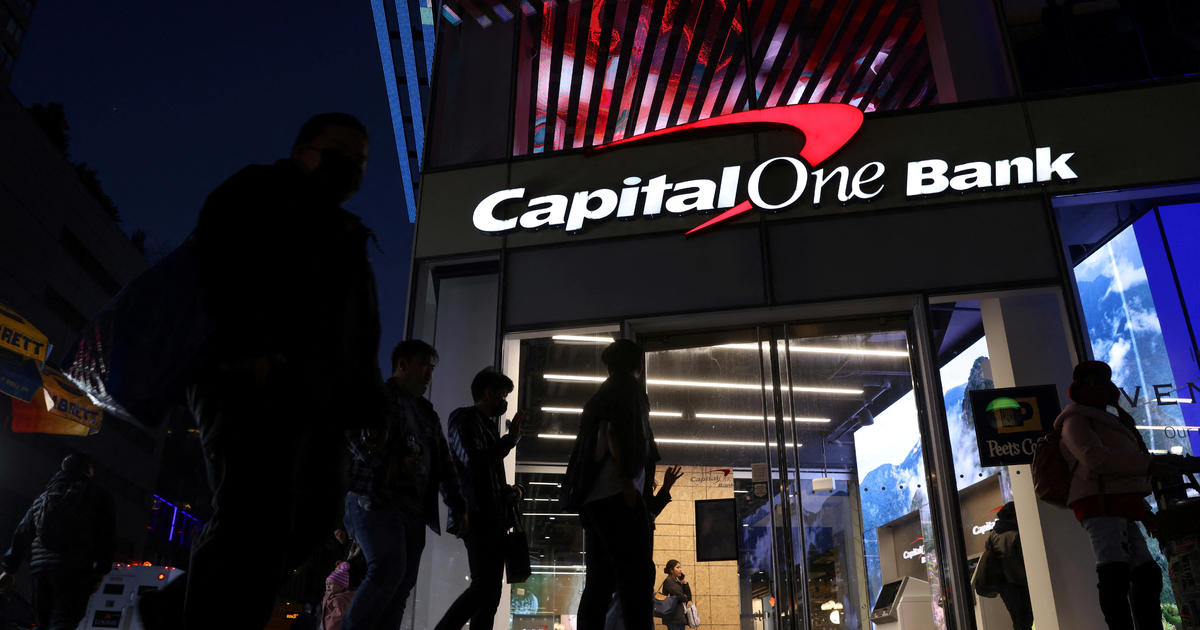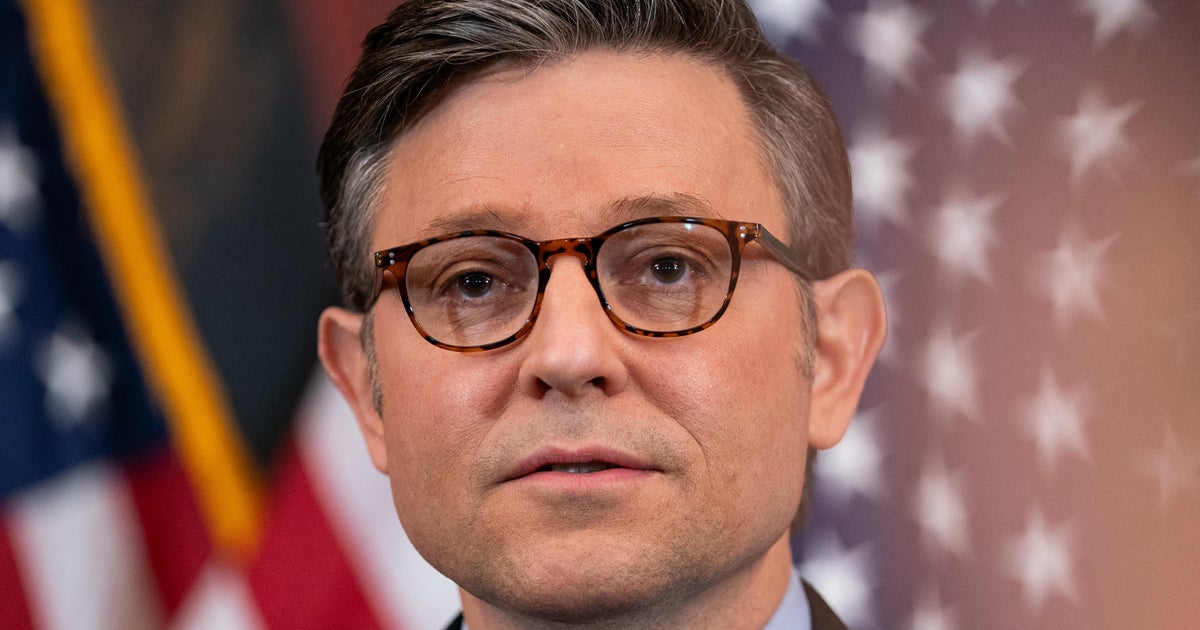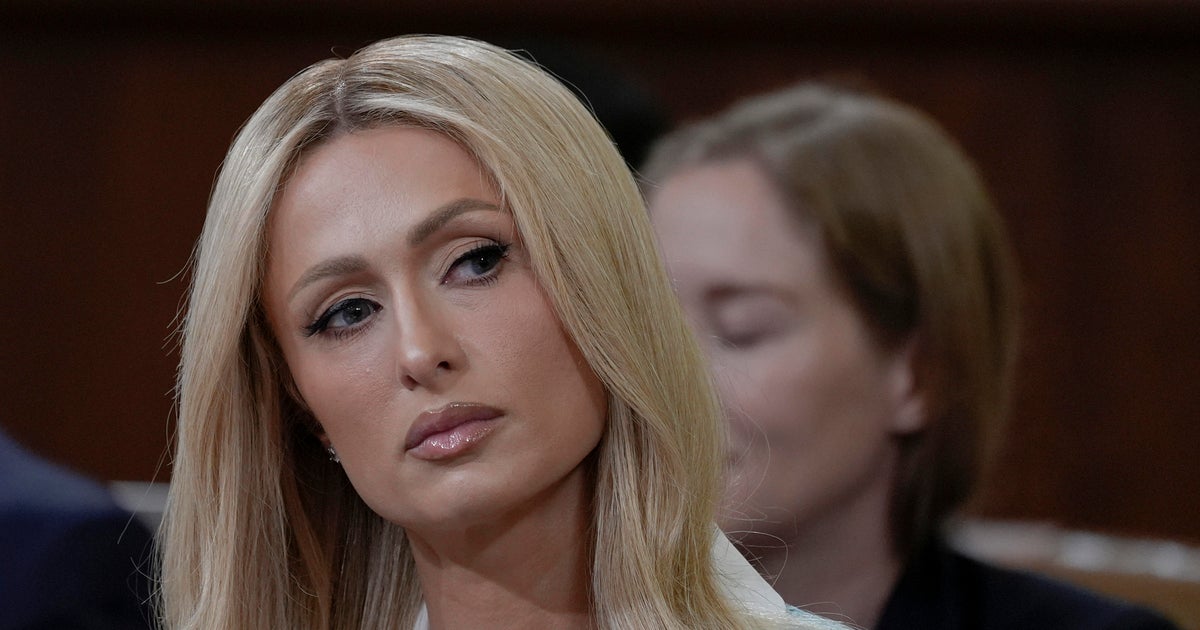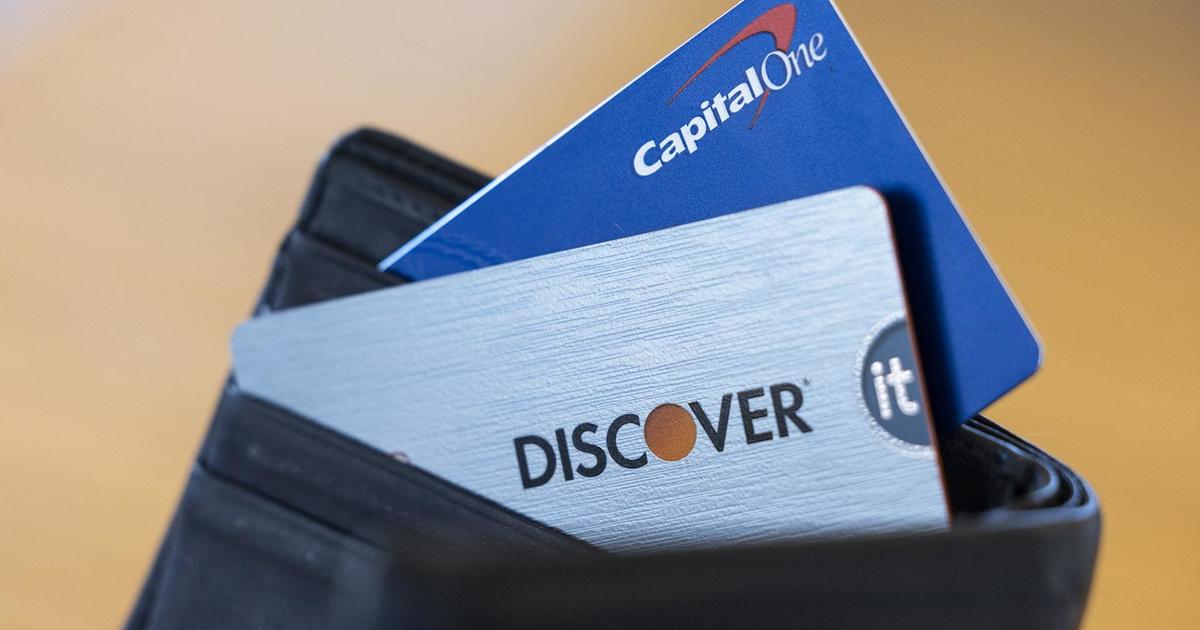CBS News
Capital One says it’s buying Discover for $35 billion, creating credit card and payments giant

New York — Capital One Financial said it will buy Discover Financial Services for $35 billion, a deal that would bring together two of the nation’s major credit card companies as well as potentially shake up the payments industry, which is largely dominated by Visa and Mastercard.
Under the terms of the all-stock transaction, Discover Financial shareholders will receive Capital One shares valued at nearly $140. That’s a significant premium on the $110.49 that Discover shares closed at Friday. Capital One said the deal is expected to close late this year or early next.
The deal marries two of the largest credit card companies that aren’t banks first, like JPMorgan Chase and Citigroup, with the notable exception of American Express. It also brings together two companies whose customers are largely similar — often Americans who are looking for cash back or modest travel rewards, compared to the premium credit cards dominated by AmEx, Citi and Chase.
“This marketplace that’s dominated by the big players is going to shrink a little bit more now,” said Matt Schulz, chief credit card analyst at LendingTree.
It also will give Discover’s payment network a major credit card partner in a way that could make the payment network a major competitor once again. The U.S. credit card industry is dominated by the Visa-Mastercard duopoly with AmEx being a distance third and Discover an even more distant fourth. It’s unclear whether Capitol One will adopt the Discover payment system or set up a payment network that allows parallel use of Discover and a second payment network like Visa.
“Our acquisition of Discover is a singular opportunity to bring together two very successful companies with complementary capabilities and franchises, and to build a payments network that can compete with the largest payments networks and payments companies,” said Richard Fairbank, the chairman and CEO of Capital One, in a statement.
It’s unclear whether the deal will pass regulatory scrutiny. Nearly every bank issues a credit card to customers but few companies are credit card companies first, and banks second. Both Discover – which was long ago the Sears Card – and Capital One started off as credit card companies that expanded into other financial offerings like checking and savings accounts.
Consumer groups are expected to put heavy pressure on the Biden Administration to make sure the deal is good for consumers as well as shareholders.
“The deal also poses massive anti-trust concerns, given the vertical integration of Capital One’s credit card lending with Discover’s credit card network,” said Jesse Van Tol, president and CEO of the National Community Reinvestment Coalition.
With its purchase of Discover, Capital One is betting that Americans’ will continue to increasingly use their credit cards and keep balances on those accounts to collect interest. In the fourth quarter of 2023, Americans held $1.13 trillion on their credit cards, and aggregate household debt balances increased by $212 billion, up 1.2%, according to the latest data from the New York Federal Reserve.
As they run up their card balances, consumers are also paying higher interest rates. The average interest rate on a bank credit card is roughly 21.5%, the highest it’s been since the Federal Reserve started tracking the data in 1994.
Capital One has long has a business model looking for customers who will keep a balance on their cards, aiming for customers with lower credit scores than American Express or even Discover.
At the same time, the two lenders have had to boost their reserves against the possibility of rising borrower defaults. After battling inflation for more than two years, many lower- and middle-income Americans have run through their savings and are increasingly running up their credit card balances and taking on personal loans.
The additional reserves have weighed on both banks’ profits. Last year, Capital One’s net income available to common shareholders slumped 35% versus 2022, as its provisions for loan losses soared 78% to $10.4 billion. Discover’s full-year profit sank 33.6% versus its 2022 results as its provisions for credit losses more than doubled to $6.02 billion.
Discover’s customers are carrying $102 billion in balances on their credit cards, up 13% from a year earlier. Meanwhile, the charge-off rates and 30-day delinquency rates have climbed.
Beyond boosting bank deposits and loan accounts, the acquisition would give Capital One access to the Discover payment processing network. While smaller than industry giants Visa and Mastercard, the Discover network will enable Capital One to get revenue from fees charged for every merchant transaction that runs on the network.
Discover has been operating under heightened scrutiny from regulators. Last summer, the company disclosed that beginning around mid-2007, it incorrectly classified certain card accounts into its highest merchant pricing tiers. The company also received an unrelated consent order from the Federal Deposit Insurance Corporation over its customer compliance management.
Analysts at Citigroup say the regulatory issues may have prompted the sale.
“We are surprised that DFS would sell, but suppose that its regulatory challenges such as its recent October FDIC consent order and the card product misclassification issue may have opened the door for the board to consider strategic alternatives that it may not have in the past,” wrote analysts Arren Cyganovich and Kaili Wang in a note to clients.
CBS News
House conservatives revolt over GOP-backed spending bill to avoid shutdown

Washington — House Speaker Mike Johnson is facing a conservative revolt over a last-minute measure to keep the government funded into the spring and avoid a shutdown, with some Republicans strongly objecting to billions of dollars in spending that has been added to the bill.
Congressional leaders unveiled the stopgap funding measure late Tuesday after days of negotiations, facing a Friday deadline to approve new spending. The bill would extend government funding through March 14, but it also includes disaster aid, health care policy extenders and a pay raise for members of Congress, among other provisions. The disaster relief portion of the bill alone carries a price tag of $110 billion.
The legislation immediately sparked anger from multiple members of the House Republican conference, mostly targeted at Johnson. While the speaker had pledged to avoid the kind of massive, end-of-year spending bills that conservatives loathe, the final product resembled a scaled-down version of what the party’s right flank has railed against for years now.
But the Republicans’ slim majority in the House means Johnson will need Democratic votes to pass the bill, a dynamic that gave the minority more leverage to extract concessions during negotiations.
Johnson acknowledged that the bill was intended to be “very skinny” before a “couple of intervening things” occurred, citing the devastation left by hurricanes earlier this year.
Alex Wong/Getty Images
Before the text of the bill was released, Johnson dismissed Republican concerns that the continuing resolution was equivalent to an “omnibus” bill, a term used when Congress packages the annual appropriations bills that fund many federal government agencies into one large piece of legislation.
“This is not an omnibus, OK?” Johnson said at his weekly news conference on Tuesday. “This is a small [continuing resolution] that we had to add things to that were out of our control. These are not man-made disasters. These are things that the federal government has an appropriate role to do.”
Further angering conservatives was Johnson’s vow to give members 72 hours to read the bill before a vote. But a vote could come as soon as Wednesday, giving lawmakers less than 24 hours to get through the nearly 1,550-page text.
Rep. Eric Burlison, a Missouri Republican, on Tuesday called the process “a total dumpster fire.” He said he was “disappointed” in Johnson and called on him to “communicate better.” Other members, like Rep. Chip Roy of Texas, have dubbed the bill the “Cramnibus.”
The fight could prompt a challenge to Johnson’s speakership when the new Congress convenes on Jan. 3. Rep. Thomas Massie, a Kentucky Republican, said Wednesday that he won’t support Johnson in the speaker’s election.
“I’m not voting for him,” Massie said. “This solidifies it.”
Massie said he’s spoken with other members who have a similar stance.
Johnson has run into a buzzsaw of opposition outside the House as well. Elon Musk, the co-head of President-elect Donald Trump’s advisory Department of Government Efficiency, said in a post on X that any lawmaker “who votes for this outrageous spending bill deserves to be voted out in 2 years.” Musk posted dozens of times throughout the day calling for lawmakers to oppose the bill, which he called “criminal.”
The speaker told Fox News earlier in the day that he had discussed the situation with Musk and Vivek Ramaswamy, the other DOGE co-head, on Tuesday evening. Johnson said he emphasized to them that passing a continuing resolution now would be “clearing the decks” and allow the incoming GOP majorities to “put our fingerprints on the spending” in March. Both Musk and Ramaswamy came out strongly against the bill anyway.
Trump himself has not indicated publicly how he thinks lawmakers should vote, leaving Republicans in Congress to fight amongst themselves.
While Johnson said he and GOP leaders had hoped to move forward with the legislation under the regular process, including bringing the bill through the House Rules Committee, pushback from committee members on the party’s right flank threatened to prolong the path to passage. The legislation is expected to instead be brought up under suspension of the rules, meaning a two-thirds majority will be required for passage.
The stopgap measure will lapse about two months into Trump’s second term, setting up another budget fight as Republicans try to pass Trump’s top priorities during his first 100 days. Though they’ll have control of both chambers of Congress, House Republicans will be operating with a thinner majority until vacant seats held by members joining the Trump administration are filled.
contributed to this report.
CBS News
Biden comments on dangers of mysterious drones in U.S.

Watch CBS News
Be the first to know
Get browser notifications for breaking news, live events, and exclusive reporting.
CBS News
Paris Hilton’s bill to protect minors at residential treatment facilities heads to president’s desk

Heiress, model and actor Paris Hilton is the force behind a bill headed to President Biden’s desk that’s aimed at preventing the abuse of minors at rehab and other residential facilities.
The House passed the Stop Institutional Child Abuse Act in a bipartisan 373-33 vote Wednesday, after the Senate passed the bill by unanimous consent earlier in the week. It’s a cause that’s personal to Hilton, who says she was abused at residential treatment facilities as a teen. Hilton lived in a series of residential treatment facilities from the age of 16, testifying before Congress in June that she had been violently restrained, stripped of clothing and tossed into solitary confinement, among other experiences.
“Today is a day I will never forget,” Hilton wrote on Instagram. “After years of sharing my story and advocating on Capitol Hill, the Stop Institutional Child Abuse Act has officially passed the U.S Congress. This moment is proof that our voices matter, that speaking out can spark change, and that no child should ever endure the horrors of abuse in silence. I did this for the younger version of myself and the youth who were senselessly taken from us by the Troubled Teen Industry.”
Now 43, Hilton has championed child protection legislation on Capitol Hill for years, encouraging lawmakers to pass regulations to help protect troubled teens from abuse at treatment centers. Hilton met with lawmakers on Capitol Hill this week, urging them to take up the legislation before the 118th Congress ends.
Democratic Sen. Jeff Merkley and Democratic Rep. Ro Khanna introduced the legislation in the House and Senate, and they were joined by Republican Sens. John Cornyn and Tommy Tuberville and Republican Rep. Buddy Carter.
“Children across the country are at risk of abuse and neglect due to a lack of transparency in institutional youth treatment programs,” Khanna said in a statement. “The industry has gone unchecked for too long. Paris Hilton and other survivors of abuse in this broken system have bravely shared their stories and inspired change. I’m proud to lead this legislation with my colleagues to protect the safety and well-being of kids.”
The legislation creates a federal work group on youth residential programs to oversee the health, safety, care, treatment and placement of minors in rehab and other facilities. It also directs the Department of Health and Human Services to make contact with the National Academies of Sciences, Engineering and Medicine to make recommendations about state oversight of such programs.
Hilton is the great-grandaughter of Conrad Hilton, who founded Hilton Hotels.






